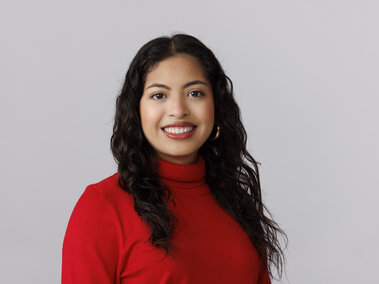PURPOSE
Discover Your Why
You are here for a reason and we’re here to support you. Your purpose is unique and evolves as you do. Whether your purpose is tied to a major, an identity, your communities, a career goal, or a cause, reflecting on your purpose will help you craft and personalize your UNL experiences. And if you haven't figured out your purpose, that's okay, too. We are here to help you explore your why throughout your journey.
Dinushi Jayasekara:
ORIENTATION LEADER
“As a WHT peer mentor, I have the privilege of supporting first-year students as they transition into college life. This role has been incredibly rewarding as it allows me to build meaningful connections with students, share my own experiences and provide guidance on academics, campus resources and personal growth. Being a peer mentor has not only strengthened my communication and leadership skills but has also deepened my understanding of the diverse challenges and perspectives within our campus community. It's inspiring to see the growth and confidence in the students I mentor, and it motivates me to continue fostering a supportive and inclusive environment. This job has been a transformative experience, shaping me both personally and professionally and reaffirming my passion for helping others succeed.”

Questions:
- Why are you here?
- Why UNL?
- What motivates you to pursue a degree?
- What are your dreams? Your values?
- What do you want from your Husker experience?
- What are you passionate about?
- What ideas intrigue you?
- What questions, topics, or disciplines inspire you?
- What courses and experiences will help you explore your purpose and imagine the life you want to live?
Seth Wert
ORIENTATION LEADER
"Ever since I was little, I’ve always known I wanted to work in the agricultural field, but I wasn’t exactly sure how to make that happen. It wasn’t until high school that I discovered my true passion: helping others find their place in the agricultural industry. I realized how much I enjoyed guiding people toward careers that connected them to something they loved. As I looked around at the incredible teachers who inspired me in the classroom, it hit me—agricultural education was the perfect fit for me. I knew I wanted to make a difference in students' lives, just like my teachers had done for me. Now, my future is clear. I want to return to rural Nebraska and become an agricultural educator at the high school level. I believe in the power of agriculture to change lives, and I want to help the next generation discover the opportunities that exist within this field."
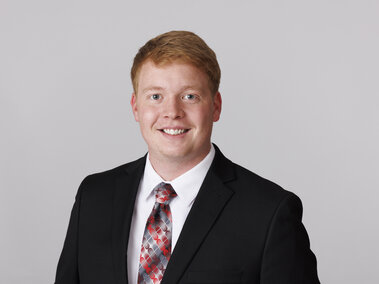
OWNERSHIP
Own Your Experience
Your UNL experience belongs to you. Our faculty and staff are here to support you every step of the way, but you are responsible for putting in the work. Owning your experience involves engaging in your courses and learning from and with others in the Husker community. Ownership also means taking advantage of campus resources and planning for opportunities that you want to experience. We are excited to help you make the most of your experience, but you are the owner.
Andy Nguyen
ORIENTATION LEADER
“Although it may feel much easier to stick to what you already know, it is so important to leave room for new opportunities, both socially and academically. Remember that the majority of incoming students are going through this similar adjustment, so embrace change in this new environment! It may sound cliche, but college really is a big step into a new-found world of independence. That’s what Big Red Welcome week is all about: meeting other new students, getting comfortable on campus and joining things that pique your interest. It may feel overwhelming at first but try as many things as you can! You’ll never know if it was for you unless you tried! Be sure to explore the hundreds of clubs, organizations, intramurals, etc. around campus to personalize and set the stage for your own Husker experience!”
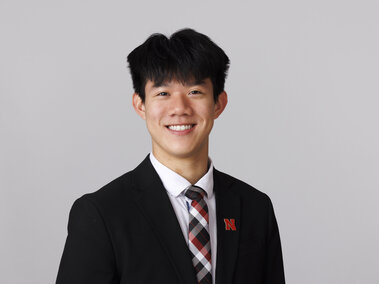
Questions:
- What are your goals for being at UNL and how can you make sure you achieve them?
- What does engaging in learning look like for you?
- How will you prioritize your success?
- How do you plan to organize your time?
- When you experience challenges (and everyone does!) do you know which strategies or supports might help you to bounce back?
- Are you aware of campus resources and services that can also help?
- What new experiences and opportunities would you like to try and how can we help you to plan for them?
Alivia Olson
ORIENTATION LEADER
“As scary as it may seem, approaching a faculty member is one of the best ways you can take control of your college experience. Whether you are struggling in a class, curious about research opportunities or needing guidance in your job search, faculty are often your best resource on campus. I have found that at UNL, most faculty members want to see you succeed and are willing to work with you to make that happen. Office hours are a great way to get one-on-one time with a faculty member without having to organize a meeting or raise your hand in the lecture hall.”
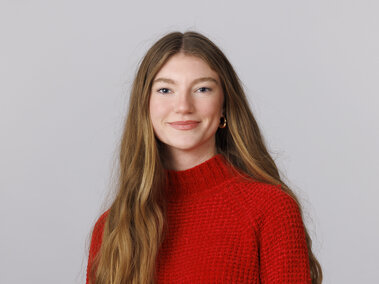
WELL-BEING
Balance Your Whole Self
Well-being is the optimal and dynamic state that allows people to achieve their full potential. Well-being includes physical, emotional, mental, academic, and social factors that impact how you feel and experience your life. By prioritizing your whole self, you help to build a supportive environment for yourself and your fellow Huskers.
Parker Wolfe
ORIENTATION LEADER
“One resource that I found on campus to be really helpful, especially as a freshman, was UNL Counseling and Psychology Services (CAPS). I had a tough transition mentally coming from high school to college, and it took me a long time to even think about getting help. Once I had some conversations with my friends and they told me about CAPS, everything changed. Being able to talk to someone about my struggles in a confidential setting really helped clear up the fog that was in front of me. Another amazing resource on campus is the University Health Center. Everyone gets sick. The health center has on campus doctors, physicians and nurses available to help you get back to feeling like your best self. Overall, these two resources have made my experience at UNL a million times better.”
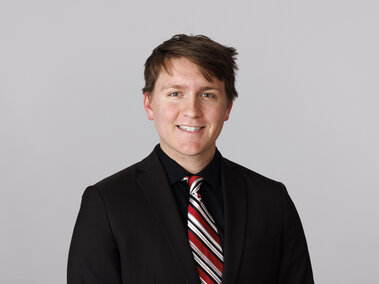
Questions:
- How do you balance your academics with your personal life?
- What helps you thrive?
- What are you grateful for?
- How do you prioritize and practice self-care?
- What strengths and practices help you to get through tough times?
- What resources help you the most?
- How can your community support you?
- How can you care for your fellow Huskers?
Ava Glover
ORIENTATION LEADER
“The most surprising thing about UNL has been how easy it is to find help when you need it. On campus, there are countless resources, whether you need help finding scholarships, applying for internships, accessing mental health services or simply receiving help on coursework. As a first-year student, I utilized tutoring through the Math Resource Center when I was struggling in calculus, and it helped me immensely. Finding these opportunities can be as simple as googling what you need, as UNL has webpages for most resources, which often include their location and hours of operation. Additionally, each college within UNL sends out weekly e-newsletters that highlight these services and any upcoming events on campus and in the greater Lincoln community. Overall, it's comforting to know that we, as students, are supported, since there are so many people willing to assist however they can.”
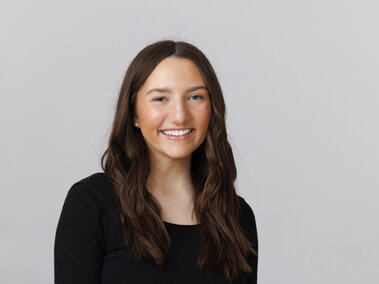
ENGAGEMENT
Get Involved
Engagement takes place in and outside of the classroom. Within courses, engagement includes actively listening, learning, and participating. Outside the classroom, engagement can mean joining clubs and organizations, attending campus events, undertaking undergraduate research, campus employment, internships, or study abroad, and networking with alumni. Engagement connects you with a diverse range of friends, mentors, professionals, and advocates and enriches your overall well-being. Engagement helps you to be part of something bigger than yourself.
Jenny Castor
ORIENTATION LEADER
“Studying abroad was an unforgettable journey that profoundly impacted me both personally and professionally. During my time in Barcelona, I grew in ways I never anticipated. One of the most transformative aspects of my experience was immersing myself in new cultures… I learned how culture influences communication, daily life and learning styles. This broadened perspective has helped me appreciate the richness of different backgrounds and recognize how much we can learn from one another… It has also prepared me to create a welcoming, inclusive classroom where every student feels valued, supported and connected.”

Questions:
- How do you actively engage in your learning? Interact with instructors and peers in courses?
- Are you taking advantage of campus speakers and events?
- What out of class experiences would you like to try?
- Are there any that would help you develop a sense of belonging? Enhance your career goals? Challenge yourself to try something new?
- Are there communities that you'd like to join and enrich?
- How might we help you to prioritize and plan for engagement throughout your Husker experience?
Josh Warner
ORIENTATION LEADER
“Joining a Registered Student Organization at UNL has been one of the most impactful parts of my college experience…Singing has always been a big part of my identity, but I knew I didn’t want to pursue it as a career. Instead, I wanted it to remain a fun hobby and a way to connect with others who share the same love for music. When I came to UNL, I worried that most musical opportunities might only be available to music majors. However, during orientation, I learned about several acapella groups on campus, mostly made up of non-music majors like me. That’s when I decided to audition for the Bathtub Dogs. I auditioned on my first day of school and was fortunate to make it. Since joining, the Bathtub Dogs have become a second family to me… This group has defined my college experience, creating lifelong memories and a community I’m truly proud to call my own.”

RELATIONSHIPS
Grow Your Communities
At UNL, we believe every person and every interaction matters. Your faculty, staff, and peers are committed to your success. Building intentional relationships will equip you to be successful in and beyond the classroom. By the time you graduate, you'll be part of a strong Husker community and will have friends, faculty, staff, and community members who care about you and are here to support you.
Harley Paprocki
ORIENTATION LEADER
“My best advice for incoming students is to step outside your comfort zone. The energy on campus after you move in is incredibly exciting, but it can also feel scary. College is the best time to take risks, such as asking a floormate to get lunch at a dining hall or go to the Big Red Welcome together. While the thought of knocking on an acquaintance’s door may turn your stomach over, know that they are in the exact same position as you! Joining an RSO is a great way to meet new people, and finding the proper organization requires a trial-by-error approach. UNL offers endless opportunities for you to thrive, and I encourage you to embrace the uncomfortable when trying something new - it could be the start of something amazing.”

Questions:
- What are you doing to develop meaningful relationships with peers, faculty, and staff?
- Whom do you rely on and who can rely on you?
- Who are your mentors?
- Who else would you like to have in your circle?
- How are you supporting others?
- How are you challenged by the people around you and what are you learning from these relationships?
- Are you developing relationships with people from different identities and backgrounds?
- How do you ensure people around you feel seen, heard, and accepted?
- What are you learning about yourself as your relationships change and evolve throughout your Husker experience?
Katelyn Guzman
ORIENTATION LEADER
“During my first semester, I struggled to find myself in spaces where I felt as though I did not belong. I yearned for a group where I could celebrate my culture, be unapologetically myself and grow as a person throughout my time at UNL. This led me to join Kappa Delta Chi Sorority, Inc. Discovering my sisters was a transformative experience. I found myself surrounded by women who shared similar values, cultures and experiences. They became my strongest support system as an out-of-state student and a woman of color. Their unwavering support has been instrumental in all my endeavors, continuously helping me evolve into the best version of myself and embracing who I am and where I come from.”
